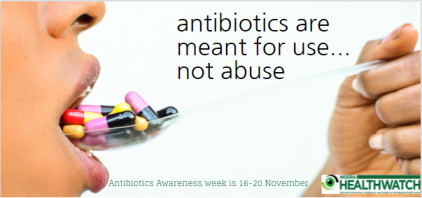Resistance to antibiotics is a growing global problem. It is particularly acute in Nigeria because of our extensive and often inappropriate use of antibiotics. Probably because of all the other public health challenges that we face, barely any attention has been given to antibiotic stewardship and it is hardly recognised as a public health need. We therefore asked Iruka N. Okeke, a Professor of Pharmaceutical Microbiology at the University of Ibadan to offer a perspective on the situation during this “Antibiotic Awareness Week”, which runs from 16- 20 November. Iruka is also the author of the book Divining Without Seeds: The Case for Strengthening Laboratory Medicine in Africa (Cornell Univ Press) and Co-Editor of Antibiotic Resistance in Developing Countries (Springer, NY).
Antibiotics are lifesavers. If they didn’t exist, far too many of us would have died young from an infected scratch, a fever, an episode of dysentery or painful pneumonia. This is particularly true in Nigeria where bacterial infections are common, and so many of us have these wonder drugs to thank for life. But antibiotics themselves are dying. Bacteria become resistant to them by the uncommon but natural process of genetic change. We humans help the process along by using antibiotics to give rare resistant variants the edge over drug-sensitive bacteria that we can control. Thus the biography of infections in the last century that began optimistically with the discovery of penicillin is moving towards a concluding tragedy.
We are killing the cure but can we help this? We need antibiotics to manage infections and so even though we know that using them shortens their life-spans, we cannot stop using them. We are addicted to these miracle drugs but our addiction is ending the miracle. While we cannot end essential use, we must bring unnecessary use of antibiotics to a halt. Patients with no infections, or with viral and parasitic infections do not need an antibiotic. Prescribers should not be offering those patients these valuable but threatened drugs.
In countries like Nigeria where prescribers are not gatekeepers, physicians should not be modeling use patterns that encourage patients to buy unneeded antibiotics. The only way for even the most skilled clinician to be sure that a fever is bacterial and in desperate need of quelling by antibiotics, or malaria or viral, in which case antibiotic administration does societal harm, is to a apply a diagnostic test. Diagnostic tests are used too infrequently in and outside our clinics. For many infectious conditions, the ideal tests are yet to be marketed. However, even when tests are available to throw light on a syndrome, they are not used when and where they should be. Even worse, some health workers order tests and then ignore their results.
One of the earlier arguments against testing, in the face of limited resources, was that laboratory investigation was costly. This is becoming increasingly untrue. Cheaper antibiotics can no longer be used in the face of widespread resistance, and more expensive, formerly ‘reserve’ antibiotics are much pricier than the simplest tests. Supportive therapy needed to keep patients alive whilst their caregivers experiment by serially prescribing different antibiotics is also prohibitively expensive. Nigeria does not yet have enough laboratories to provide testing for all the patients that need it, but then, we are currently underutilizing existing laboratories. Importantly, there are testing options that can be applied outside a laboratory at the point-of-care. Clinicians can within minutes determine whether or not a fever is caused by malaria in any facility, by using a rapid diagnostic test.
Much of today’s resistance problem is caused by resistant bacteria that are passed from one individual to the next. The most adept of these ‘pandemic bacterial clones’ have spread around the world. The only way to deal with highly transmissible resistant bacteria is to stop them in their tracks. Not treating a patient with a bacterial infection allows the microbe to spread. Then instead of one or a few individuals needing treatment, there is a crowd of the ill. More people are difficult and costlier to treat, more people die, and more antibiotic is ultimately required to deal with the problem. Untreated or improperly treated problematic infections increase the chance that a rare resistant variant will escape the mop-up and initiate an even more dangerous epidemic. Thus, just as we need to control excess use of antibiotics, we must ensure their access to those that need them.
For many of Nigeria’s common infections, there are no reserve drugs. The first-line cephalosporins and fluoroquinolones we are using for serious infections are the last affordable options in our clinics. The story is not proceeding as we would have liked but we are not powerless to watch the unfolding tragedy that is antibiotic resistance.
We cannot, as yet, alter the mechanisms by which bacteria change their DNA, but we can, by preventing excess, avoid giving resistant variants the advantage. And by ensuring access, we slow the spread of these dangerous pathogens, and ensure a healthier future for our society.
During Antibiotic Awareness Week (16-20 November, 2015), health care practitioners, health care leaders, educators, students and members of the public can pledge to become Antibiotic Guardians at www.antibioticguardian.com .





